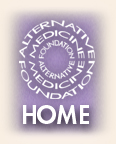|
We are bombarded with so much information nowadays coming from so many different sources that we all need to be very good at sifting and sorting reliable information from commercial hype and plain lies. The Internet is not really so different from sorting out junk mail or deciding which television channel to watch. A search for specific alternative therapies or any type of medical information on Google (or another search engine of choice) will typically produce hundreds of thousands, if not millions of hits. To narrow down your choice and select responsible, impartial information you need to:
If you follow these guidelines you will find the World Wide Web is still an excellent information resource for credible information on complementary and alternative medicine. Some of the best sites can be found in the General CAM Resources listing.
Distinguish between different sorts of web resourcesThere are 6 main types:
TIP: If you want to avoid commercial sites when performing a search and eliminate huge numbers of hits, put “NOT .com” in your search string. .
Check out the group, individual, or organization providing the siteLook for a description of the group or organization responsible for the web site and the information. This should be easily available from the home page. Look for an About Us section. There should be clear information on ownership, affiliations, staff and, where relevant, advisory boards. If there is no About Us information be wary. Look primarily for Health Science Libraries or University departments (the url, or web address, usually ends in .edu). Look for Government sites (ending in .gov) or non profit organizations (ending in .org). These are the most reliable sources of impartial information. TIP: If you want only nonprofit organizations, put "AND .org" in your search string. Beware of "Urban Legends". These are stories that circulate on the web that either have no basis in fact or are distorted and exaggerated. Many of these "tall tales" are about contaminated food or supplements. To check out these stories, go to: Snopes.com
Find out how the web site is fundedCheck for information on investors or sponsors and whether the content is biased by their interests. If you cannot find this information be wary. Be prepared to dig deep. Sometimes a patient advocacy association may seem to be impartial but when you look carefully you may find they are being funded and influenced by a pharmaceutical company using the association as a means to sell products. See also Making Sense of Medical Research Most high quality information sites do not sell products and advertisements - but that does not mean that all commercial sites are unreliable. Product information and advertising should be clearly separated from information content. Some reputable commercial sites provide “3rd party” information that is provided from a totally independent and impartial organization. See, for example Green Mountain Mycosystems who use HerbMed as their only source of research information. [Back to Contents]
Check how the information is selected and presentedMake sure you know who has written the information on a web site, the qualifications of the writer, the evidence it is based on, and whether it has been reviewed by an editorial board. Many web sites provide links to other sites. Ensure that the selection criteria are stated. Clear categorized information resources, as supplied by Health Sciences Libraries or this site (for the Alternative Medicine Foundation) are most reliable. Some sites "trade links" to boost their ratings in the search engines. Others provide only provide links that have been paid for. This is not a reliable way to ensure impartial information.
Make sure the site observes ethical practicesThe web site should be kept updated and regularly maintained
You should be able to surf freely without restriction. Reliable information sites do not bombard you with advertisements, popup ads, and other tricks to keep you on their site or lure you away
There should be a clear way to navigate through the site
Does the web site collect information about you?
Last Updated: August 16, 2006 |
||||||
|
|
||||||
 |
||||||
|
© Copyright © 1998-2010 Alternative Medicine Foundation Inc., Potomac, Maryland.
All rights reserved. |

